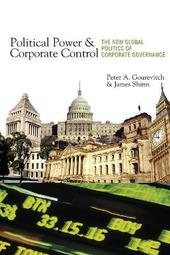
|
Political Power and Corporate Control: The New Global Politics of Corporate Governance
Paperback / softback
Main Details
| Title |
Political Power and Corporate Control: The New Global Politics of Corporate Governance
|
| Authors and Contributors |
By (author) Peter A. Gourevitch
|
|
By (author) James Shinn
|
| Physical Properties |
| Format:Paperback / softback | | Pages:368 | | Dimensions(mm): Height 235,Width 152 |
|
| Category/Genre | Ownership and organization of enterprises |
|---|
| ISBN/Barcode |
9780691133812
|
| Classifications | Dewey:338.6 |
|---|
| Audience | | Professional & Vocational | | Tertiary Education (US: College) | |
|---|
| Illustrations |
23 line illus. 53 tables.
|
|
Publishing Details |
| Publisher |
Princeton University Press
|
| Imprint |
Princeton University Press
|
| Publication Date |
5 August 2007 |
| Publication Country |
United States
|
Description
Why does corporate governance--front page news with the collapse of Enron, WorldCom, and Parmalat--vary so dramatically around the world? This book explains how politics shapes corporate governance--how managers, shareholders, and workers jockey for advantage in setting the rules by which companies are run, and for whom they are run. It combines a clear theoretical model on this political interaction, with statistical evidence from thirty-nine countries of Europe, Asia, Africa, and North and South America and detailed narratives of country cases. This book differs sharply from most treatments by explaining differences in minority shareholder protections and ownership concentration among countries in terms of the interaction of economic preferences and political institutions. It explores in particular the crucial role of pension plans and financial intermediaries in shaping political preferences for different rules of corporate governance. The countries examined sort into two distinct groups: diffuse shareholding by external investors who pick a board that monitors the managers, and concentrated blockholding by insiders who monitor managers directly. Examining the political coalitions that form among or across management, owners, and workers, the authors find that certain coalitions encourage policies that promote diffuse shareholding, while other coalitions yield blockholding-oriented policies. Political institutions influence the probability of one coalition defeating another.
Author Biography
Peter A. Gourevitch is Professor of Political Science and founding Dean at the Graduate School of International Relations and Pacific Studies, University of California, San Diego. He is the author of "Politics in Hard Times: Comparative Responses to International Economic Crises" and former coeditor of "International Organization". James Shinn Visiting Professor at Georgetown University's School of Foreign Service, where he teaches courses on technology and foreign policy. Previously he worked in the U.S. State Department's East Asia Bureau and was later a general manager, entrepreneur, and outside director for fifteen years in the high tech industry at various firms including Dialogic, which he cofounded.
Reviews"This is an exceptionally important book, meticulously researched and persuasively argued. It puts today's most pressing questions of corporate credibility and accountability in context, both historical and global. It is filled with information and insights of vital importance to anyone in the corporate world."--Nell Minow, The Corporate Library "Gourevitch and Shinn conduct comparative analysis at its best, introducing cross-country quantitative analysis where that is possible and appropriate, but also offering analytical narratives on corporate governance, its likely origins, and the political and legal structures that support it in thirteen countries (mostly in Asia and Europe, but also including Chile and the United States). They combine superb conceptual clarity with informative detail."--Richard N. Cooper, Foreign Affairs "A comprehensive examination of corporate governance."--Choice
|